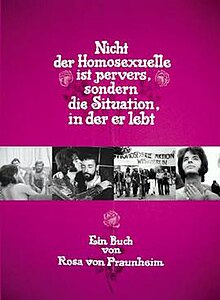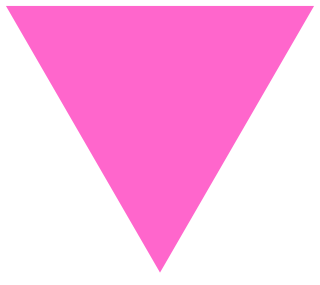
A pink triangle has been a symbol for the LGBT community, initially intended as a badge of shame, but later reappropriated as a positive symbol of self-identity. In Nazi Germany in the 1930s and 1940s, it began as one of the Nazi concentration camp badges, distinguishing those imprisoned because they had been identified by authorities as gay men or trans women. In the 1970s, it was revived as a symbol of protest against homophobia, and has since been adopted by the larger LGBT community as a popular symbol of LGBT pride and the LGBT movements and queer liberation movements.
New German Cinema is a period in German cinema which lasted from 1962 to 1982, in which a new generation of directors emerged who, working with low budgets, and influenced by the French New Wave and Italian Neorealism, gained notice by producing a number of "small" motion pictures that caught the attention of art house audiences. These filmmakers included Percy Adlon, Harun Farocki, Rainer Werner Fassbinder, Peter Fleischmann, Werner Herzog, Alexander Kluge, Ulli Lommel, Wolfgang Petersen, Volker Schlöndorff, Helma Sanders-Brahms, Werner Schroeter, Hans-Jürgen Syberberg, Margarethe von Trotta and Wim Wenders. As a result of the attention they garnered, they were able to create better-financed productions which were backed by the big US studios. However, most of these larger films were commercial failures and the movement was heavily dependent on subsidies. By 1977, 80% of a budget for a typical German film was ensured by a subsidy.

Lesbian, gay, bisexual, and transgender (LGBT) rights in Germany rank among the highest in the world; having evolved significantly over the course of the last decades. During the 1920s and the early 1930s, lesbian and gay people in Berlin were generally tolerated by society and many bars and clubs specifically pertaining to gay men were opened. Although same-sex sexual activity between men was already made illegal under Paragraph 175 by the German Empire in 1871, Nazi Germany extended these laws during World War II, which resulted in the persecution and deaths of thousands of homosexual citizens. The Nazi extensions were repealed in 1960 and same-sex sexual activity between men was decriminalized in both East and West Germany in 1968 and 1969, respectively.

Bayerischer Rundfunk, shortened to BR, is a public-service radio and television broadcaster, based in Munich, capital city of the Free State of Bavaria in Germany. BR is a member organization of the ARD consortium of public broadcasters in Germany.
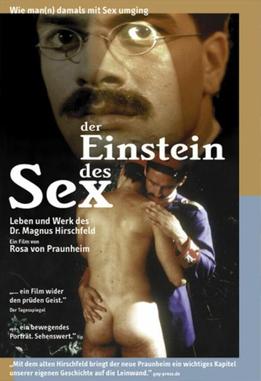
The Einstein of Sex is a 1999 German film by Rosa von Praunheim. The plot follows the life of the Jewish doctor, sexologist, and gay socialist Magnus Hirschfeld.
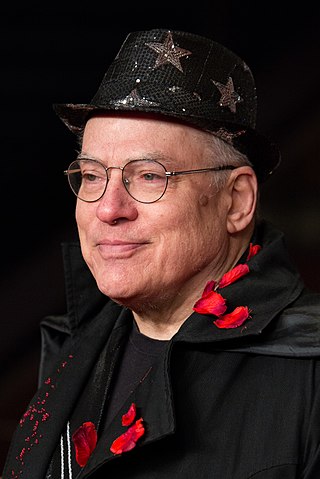
Holger Bernhard Bruno Mischwitzky, known professionally as Rosa von Praunheim, is a German film director, author, painter and one of the most famous gay rights activists in the German-speaking world. In over 50 years, von Praunheim has made more than 150 films. His works influenced the development of LGBTQ+ rights movements worldwide.
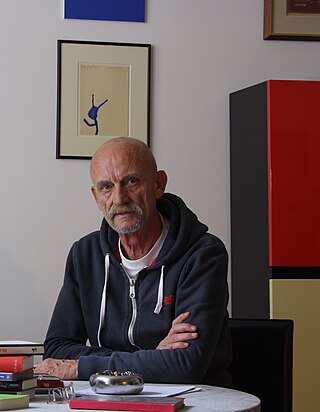
Martin Dannecker is a German sexologist and author.

Neurosia: 50 Years of Perversity is a 1995 German film directed by Rosa von Praunheim.

Switzerland, a country which has long held a stance of neutrality in its relations with other nations, has not been immune to the movement of equality for lesbian, gay, bisexual and transgender citizens. Prior to the 20th century, sodomy and other types of sexual intercourse between people of the same sex was held in various levels of legal contempt. Today, the modern LGBT rights movement in Switzerland is related to the larger international movement which developed largely after 1969.

Positive is a 1990 documentary film directed, written and produced by Rosa von Praunheim. The film received international resonance.
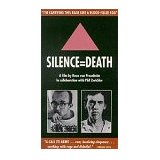
Silence = Death is a 1990 documentary film directed, written, and produced by Rosa von Praunheim. The film received international resonance.
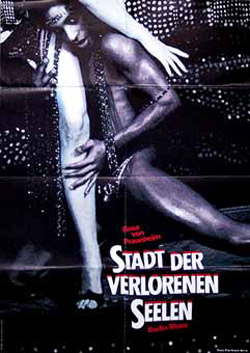
City of Lost Souls is a 1983 German musical film directed by Rosa von Praunheim and performed by drag queens, travesty artists and transgender people. The film received international attention and became a cult movie beyond the LGBT community.
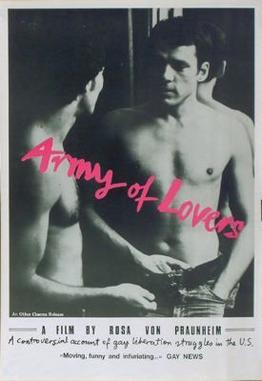
Army of Lovers or Revolt of the Perverts is a 1979 German documentary film directed by Rosa von Praunheim.
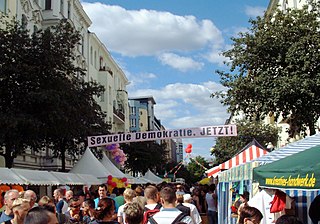
Berlin was the capital city of the German Empire from 1871 to 1945, its eastern part the de facto capital of East Germany from 1949 to 1990, and has been the capital of the unified Federal Republic of Germany since June, 1991. The city has an active LGBT community with a long history. Berlin has many LGBTIQ+ friendly districts, though the borough of Schöneberg is widely viewed both locally and by visitors as Berlin's gayborhood. Particularly the boroughs North-West near Nollendorfplatz identifies as Berlin's "Regenbogenkiez", with a certain concentration of gay bars near and along Motzstraße and Fuggerstraße. Many of the decisive events of what has become known as Germany's second LGBT movement take place in the West Berlin boroughs of Charlottenburg, Schöneberg, and Kreuzberg beginning in 1971 with the formation of the Homosexuelle Aktion Westberlin (HAW). Whereas in East Berlin the district of Prenzlauer Berg became synonymous with the East Germany LGBT movement beginning in 1973 with the founding of the HIB. Schöneberg's gayborhood has a lot to offer for locals and tourists alike, and caters to, and is particularly popular with gay men.
It is Not the Pornographer That is Perverse... is a 2018 English and German language collection of four gay pornographic short films directed by Bruce LaBruce for CockyBoys studio. The title refers to Rosa von Praunheim's film It Is Not the Homosexual Who Is Perverse, But the Society in Which He Lives (1971).

The German Democratic Republic, a state in Central Europe that existed from 1949 to 1990 before merging with the Federal Republic of Germany, was dominated by heterosexual norms. However, homosexual East Germans experienced decriminalisation during the 1960s, followed by increasing social acceptance and visibility.

In Nazi Germany, lesbians who were sent to concentration camps were often categorized as "asocial", if they had not been otherwise targeted based on their ethnicity or political stances. Female homosexuality was criminalized in Austria, but not other parts of Nazi Germany. Because of the relative lack of interest of the Nazi state in female homosexuality compared to male homosexuality, there are fewer sources to document the situations of lesbians in Nazi Germany.
Ursula Sillge is a German sociologist and LGBT activist. She organized the first national lesbian gathering in East Germany, and between 1970 and 1990 was one of the main lesbian activists in the country, pressing authorities to recognize the rights and allow visibility of the LGBT community. In 1986, she founded the Sunday Club in Berlin. It was the only secular association representing homosexuals in the 1980s, though it was not officially recognized. The organization became the first legal association to represent the LGBT community in East Germany when it was allowed to register in 1990. Sillge resigned as director of the Sunday Club in 1991 to found the LGBT archive known as the Lila Women's Archives. After the fall of the Berlin Wall, she was able to earn her doctorate. In addition to running the archives, she has published several works about homosexuality and women behind the Iron Curtain.
Vienna, the capital of Austria, has an active LGBTQIA+ community. Vienna is considered Austria's queer capital, with several LGBTQIA+ spaces, organisations and a history of LGBTQIA+ activism going back to the late 19th century.
The Sonntags Club, founded in 1987, was the first secular LGBT group in East Germany. The group originated out of the HIB which was banned in the late 1970s by the socialist regime. The group became the Sonntags Club in the 1980s when it went underground and began renting a meeting space only available on Sundays, hence the name. The Club was located in East Berlin, and though never officially recognized in the German Democratic Republic, its members continued to advocate for LGBT rights and freedoms in the years to follow.
